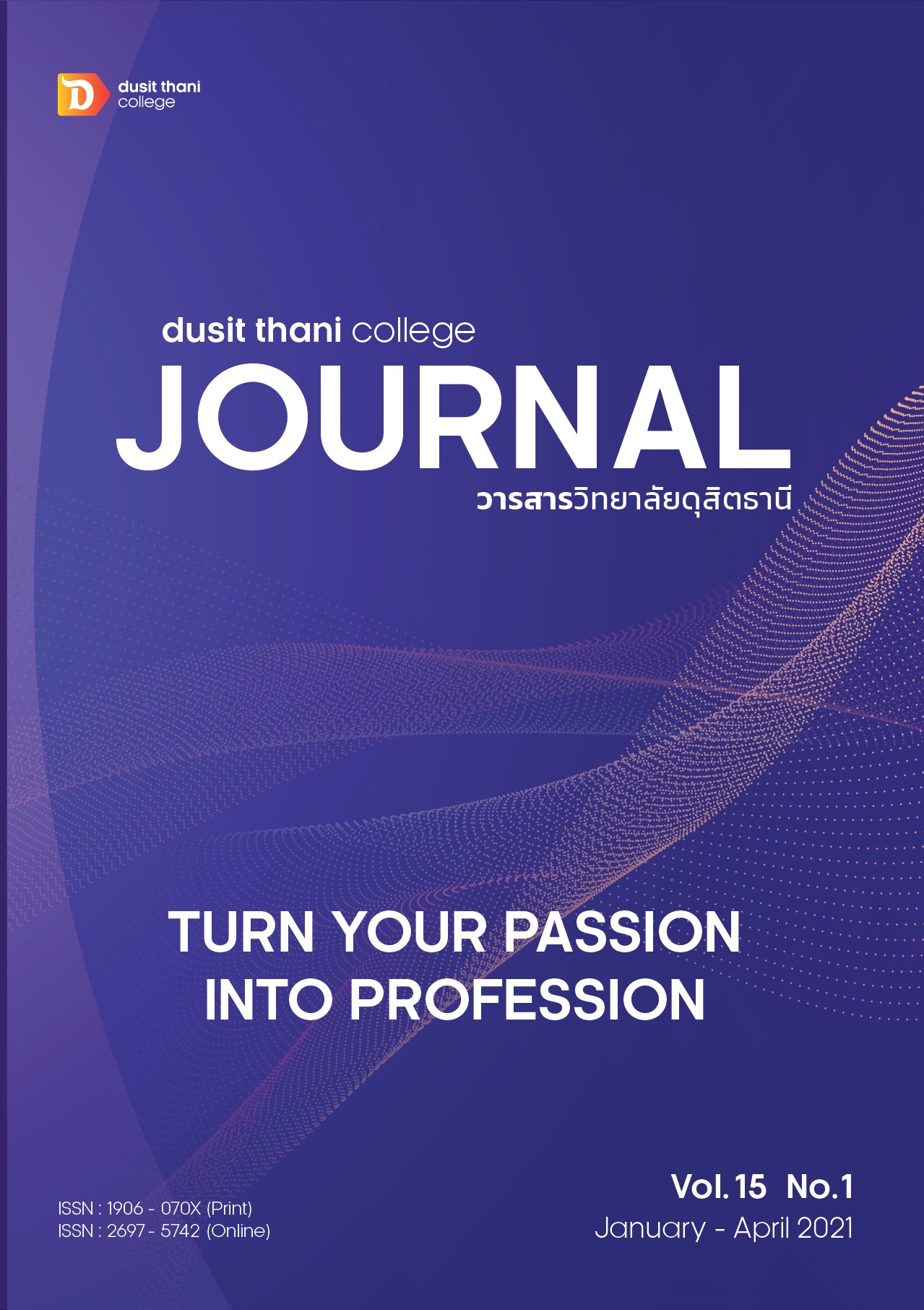SOCIAL MEDIA LITERACY OF THAI STUDENTS IN DIGITAL AGE
Main Article Content
Abstract
This article aimed to observe to know whether students who used social media on a regular basis had awareness of the social media. The qualitative data were collected from the discussions with 70 First to Second year students at Dusit Thani College. Social media concepts and media literacy were the fundamental concepts for creating the questions of inquiries. It was found that the students were aware of most social media in the following aspects: 1. Know how to use social media in a variety of ways. For example, quickly and variously in searching for study and work-related resources, meeting with social groups that shared the same interests, relieving stress by enjoying entertainment media. 2. Able to analyze information displayed on online media whether to be credible or deceptive in any ways. For example, not trusting information from the same single source, not accessing, or using information from websites with exaggerated and biased information, and ignoring websites asking for unnecessary personal information. 3. Know the benefits and harms of using too much social media, such as saving cost and time for communication with others, and quickly obtaining information. As for the harmful effects, it could ruin relationship with people around them if they are too obsessed with the social media. It could cause distortion in the use of Thai language in using incorrect grammar or using language to deceive or abuse others, for instance. It could lead to the result of academic decline. Furthermore, staring at the screen of devices for long periods of time could damage their eyesight.
Article Details
Article Screening Policy
- All research and academic articles to be published must be considered and screened by three peer reviews in the relevant field / article.
- All articles, texts, illustrations and tables published in the journal are the personal opinions of the authors. Editors don't always have to agree. And no responsibility whatsoever is the sole responsibility of the author.
- The articles to be published must never be published. Where did you first publish? And not in the consideration of other journals If the audit found that there has been a duplicate publication It is the sole responsibility of the author.
- Any article that the reader sees as being plagiarized or impersonated without reference. Or mislead the work of the author Please let the journal editor know it will be your greatest blessing.
References
Interview
Boonrod, A. (2020). “Understanding the Connected Consumers behavior of Thai.
people in the digital society age”. Retrieved from
http://www.bangkokbiznews.com/blog/detail/641241
Boyd, D., Lalita P. Translation (2018). Understanding the new
world of adolescents in the Internet era. Bangkok: Bookscape
David, M. (2020). Facebook Impacts Our Social Behavior. Turns Out, we are
Obsessed. From https://siliconangle.com/2011/02/23/Facebook-impacts-our-social-behavior-turns-out-were-obsessed/ (12 April 2020).
Electronic Transactions Development Agency (ETDA). (2016). User Behavior Survey
Report. Thailand Internet User Profile 2016. Bangkok: Electronic Transactions Development Agency.
Jobs DB (Thailand). (2020). "Learn, adapt, keep pace with 6 business trends. Work in the
digital age". Retrieved from https://th.jobsdb.com/th-th/articles/
Jun Dara, P. (2018). Society Depends “Just Look Up”. Bangkok: Book Express.
Phanphimon Wipulakorn, female doctor. “Nomophobia” Fear of the lack of a mobile phone. Retrieved from https://med.mahidol.ac.th
/ramachannel/home/article/
Miller, D., Costa, E., Haynes, N. (2019). Jindanon T. Translation. Why We
Post: Shining Social Media Culture Through Digital Anthropology. Bangkok: Bookscape
National Statistical Office. (2016). Executive Summary: Use of Information and
Communication Technology. In the household 2016. Bangkok: National Statistical Office.
Office of the Royal Society of Thailand. (2020). The Dictionary of the Royal Institute of
Thailand 2011. Retrieved from http://www.royin.go.th/dictionary/.
-------------------------- . The Dictionary of Contemporary Education Terms, 2015. Retrieved
From http://www.royin.go.th/dictionary/
Panyamethikul, S. (2015). Language and Internet. Bangkok: Print Corner
Pantabutr, S. (2020). "Living like a contemporary in the digital age". Retrieved from
https://www.tcithaijo.org/index.php/jcosci/article/view/111551
Potter, W. James. (2014). Media Literacy. (7th ed.). University of California, Santa
Barbara, US: Sage Publications.
Suksida, T. (2020). "Digital Human" and the Fundamentals of Safe Living in the Digital Age. http://blog.dpu.ac.th/ajtonrak/index.php/2018/04/10/ digital human world/
Sukonrattanamethee, N. and Moktar, N. (2019). Social media literacy of
youth for citizenship in democratic society. Bangkok: Research and Development Office King Prajadhipok's Institute
Thien Thai, J. (2020). Impact of social media Towards changes in Thai society and
culture "Retrieved from https://www.chula.ac.th/news/27969/.
Viwatpanich, N. (2015). Developing social media literacy skills. Journal of
Graduate Studies Valaya Alongkorn Rajabhat University Under Royal Patronage, Year 9, Issue 3, September - December 2015.
Williamson, Andy. (2020). Social Media Guidelines for Parliaments. Retrieved from
http://www.ipu.org/PDF/publications/SMG2013EN.pdf
William F. Ogburn. (2020). Culture Lag. Retrieved from
https://www.baanjomyut.com/library/social_sciences /33.html
Zeevi, D. (2020). The Ultimate History of Facebook [INFOGRAPHIC]. Retrieved from
https://www.socialmediatoday.com/content/ultimate-history-facebook-infographic


